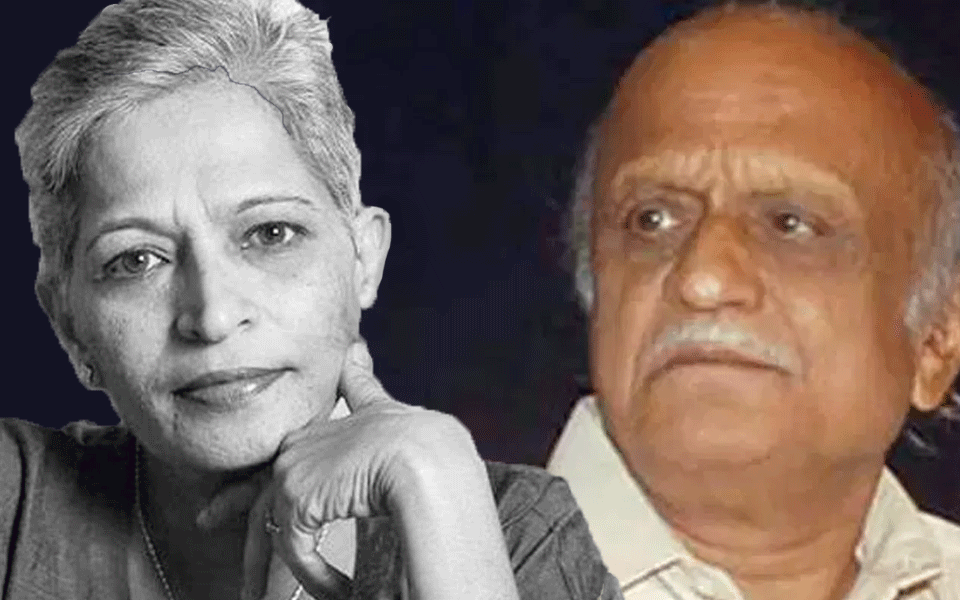New Delhi, Feb 26: The Supreme Court on Tuesday transferred the probe into the killing of rationalist M M Kalburgi to the SIT investigating the murder case of journalist-activist Gauri Lankesh after Karnataka government said there were common links in the two cases.
Kalburgi, a former vice-chancellor of Hampi University and well-known epigraphist, was shot dead at his residence in Kalyan Nagar in Dharwad, Karnataka, on August 30, 2015.
Born in 1938, he was a Sahitya Akademi award-winning writer of old Kannada literature.
The state Crime Investigation Department was probing Kalburgi's killing and the SIT was investigating the murder of Lankesh in September 2017 in Bengaluru.
During the hearing, the top court said the SIT probe into Kalburgi's killing will be monitored by the Dharwad bench of the Karnataka High Court.
A bench of justices R F Nariman and Vineet Saran said if killings of Kalburgi, Lankesh and social activist Govind Pansare and rationalist Narendra Dabholkar are linked, it should be probed by one agency and monitored by one high court.
Advocate Devadatt Kamat, appearing for Karnataka government, said there is already an SIT probing the Lankesh case, while a Maharashtra Special Investigation Team was probing the killing of Pansare in 2015.
He said the CBI was probing Dabholkar's killing on August 20, 2013.
The apex court's order came on a plea by Kalburgi's wife, who had alleged that there was a common link between the murder of her husband and that of Dabholkar and Pansare, and hence the probe should be done by CBI.
On January 25, the top court had termed the plea "very serious case".
On December 11 last year, the court had favoured a CBI probe into the murders of Kalburgi, Pansare and Lankesh, if there appeared any "common thread" in these incidents.
The killings of all these three activists happened within a period of five years.
The top court had asked the CBI to inform it whether it would like to investigate these three murder cases as it is already probing the killing of Dabholkar.
Karnataka police in its status report had told the top court that there appears to be an "intimate connection" between the killings of Kalburgi in 2015 and Lankesh in 2017.
The court had observed that one probe agency should investigate all the four cases if prima facie it appears that there is a "common thread" in the murders.
The top court on November 26 last year had pulled up Karnataka government for "doing nothing and just fooling around" with the investigation and indicated it may transfer the case to the Bombay High Court.
The apex court on January 10 last year had sought the response of probe agencies NIA and CBI and the two state governments on the allegation of Uma Devi that no substantial investigation has been carried out so far in the murder case.
Let the Truth be known. If you read VB and like VB, please be a VB Supporter and Help us deliver the Truth to one and all.
Panaji (PTI): As part of a crackdown against tourist establishments violating laws and safety norms in the aftermath of the Arpora fire tragedy, Goa authorities on Saturday sealed a renowned club at Vagator and revoked the fire department NOC of another club.
Cafe CO2 Goa, located on a cliff overlooking the Arabian Sea at Vagator beach in North Goa, was sealed. The move came two days after Goya Club, also in Vagator, was shut down for alleged violations of rules.
Elsewhere, campaigning for local body polls, AAP leader Arvind Kejriwal said the fire incident at Birch by Romeo Lane nightclub at Arpora, which claimed 25 lives on December 6, happened because the BJP government in the state was corrupt.
An inspection of Cafe CO2 Goa by a state government-appointed team revealed that the establishment, with a seating capacity of 250, did not possess a no-objection certificate (NOC) of the Fire and Emergency Services Department. The club, which sits atop Ozrant Cliff, also did not have structural stability, the team found.
The Fire and Emergency Services on Saturday also revoked the NOC issued to Diaz Pool Club and Bar at Anjuna as the fire extinguishers installed in the establishment were found to be inadequate, said divisional fire officer Shripad Gawas.
A notice was issued to Nitin Wadhwa, the partner of the club, he said in the order.
Campaigning at Chimbel village near Panaji in support of his party's Zilla Panchayat election candidate, Aam Aadmi Party leader Kejriwal said the nightclub fire at Arpora happened because of the "corruption of the Pramod Sawant-led state government."
"Why this fire incident happened? I read in the newspapers that the nightclub had no occupancy certificate, no building licence, no excise licence, no construction licence or trade licence. The entire club was illegal but still it was going on," he said.
"How could it go on? Couldn't Pramod Sawant or anyone else see it? I was told that hafta (bribe) was being paid," the former Delhi chief minister said.
A person can not work without bribing officials in the coastal state, Kejriwal said, alleging that officers, MLAs and even ministers are accepting bribes.





